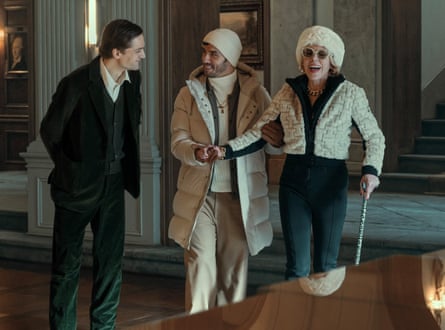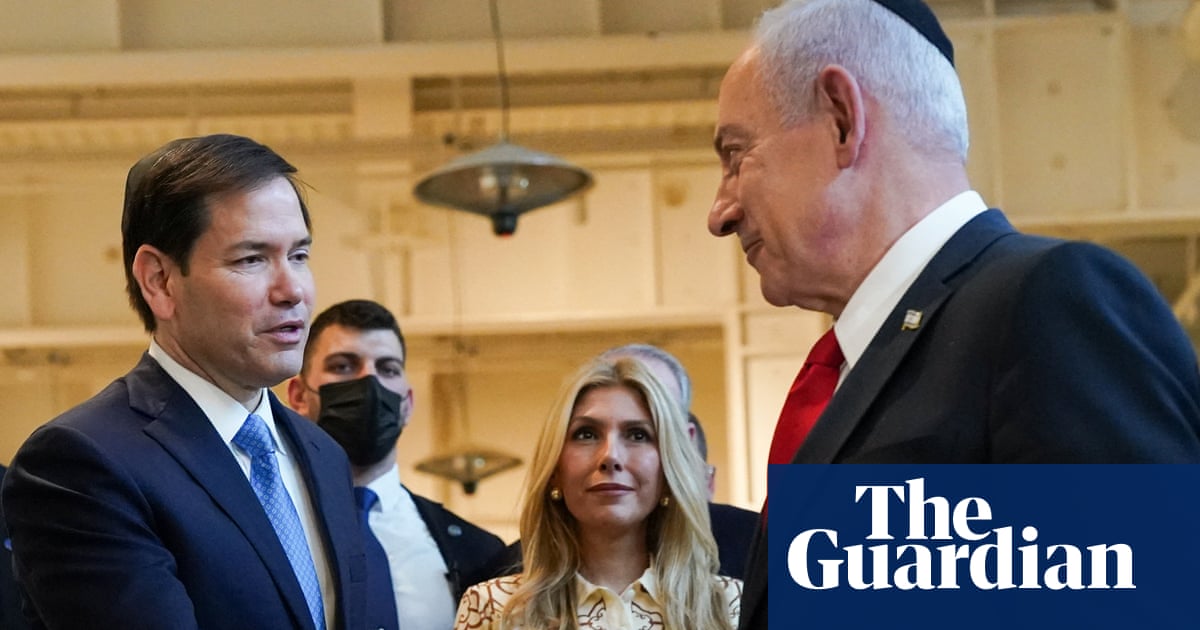The wig is better. Everything else is worse. The second series of Nine Perfect Strangers – which was so clearly set up by the open-ended finale of the original, starring Nicole Kidman in a blond hairpiece that would disgrace a four-year-old’s Frozen birthday party – is here.
Mad/bad/traumatised wellness guru/cult leader/visionary genius Masha (Kidman) was last seen driving to freedom after experimenting on the stupid, affluent guests at her California health retreat for the stupid and affluent. Tranquillum House was the name, microdosing subjects with psychotics and without consent so they hallucinated dead children and fires was the game. Plus, constant surveillance by hidden cameras feeding private information back to Masha at all times. Let me stop you there and say – well, yes, quite. But Melissa McCarthy as Frances, an ebullient novelist with writer’s block, and Bobby Cannavale as Tony, a former football player, now drug addict who bonds with her, just about kept things afloat.
They are gone now. Although Frances, we are told, has written a bestseller about her experience that has helped Masha become a celebrity on the lucrative speech circuit, despite the “multiple federal investigations” – as she reminds one of the whoopingly keen audiences hanging over her. Still, the steady stream of process servers and subpoenas are keeping her from the important work of messing with people’s blood work and minds, so when an old friend offers her the chance to continue it in an isolated former asylum in the Alps – let’s call it Foreshadowingum House – she takes it. A very pro-data and pro-consent-gathering Austrian scientist called Martin (Lucas Englander) will be her right-hand man, and I cannot see this causing any tensions at all.
Masha installs the secret CCTV that all good doctors need and waits to see who the scriptwriters, now working without Liane Moriarty’s bestseller to guide them, will send her. The good news is that they include the mighty Christine Baranski (The Good Wife, The Good Fight), perfectly cast as Victoria, the effortlessly devastating mother of highly strung Imogen (Schitt’s Creek’s Annie Murphy), who has arranged the trip in the hope of reconciling some of their differences. Victoria brings along her toyboy, so there is possibly more work to be done than even Imogen expected.
The other good news is that Murray Bartlett (the best thing in the first season of The White Lotus) is there, too, playing a children’s TV star suffering the fallout of an unexpected onscreen revelation. And Kidman’s visage has lost a small degree of the disturbing immobility that has dogged her past few years.

The bad news is that even with the star’s rediscovered ability to emote facially, the new series fails to spark into life, even of the absurd kind that the first offered. Partly this is to do with the unrelatability of so many of the characters – including a former piano prodigy who finds she can no longer play, despite her girlfriend’s love and encouragement, a nun having a crisis of faith and ominous flashbacks to a woman in childbirth under her care, a billionaire potential investor in the asylum/retreat/psilocybin mill, his charming/boring son who gets it on with Imogen, and probably some others … but it feels pointless to go on.
And partly it is because the surveillance and the drugging start from the beginning, with the guests aware of the latter and probably with some suspicion of the former. The problem with drugging all the characters in your narrative is that anything becomes possible and nothing becomes consistent, recognisable or predictable, and there is little for the viewer to invest in. There is no point engaging with something that can pull out a mushroom-based deus ex machina at any moment and resolve any plot point or start another hare running with no effort or earning of the twist.
Plus, as the group’s trip round a local taxidermy museum – which I presume is a common institution in alpine villages and not simply a lazy device to provide a suitably disorienting backdrop for the scenes – after they have taken their first bespoke drug cocktails proves, there is nothing more boring than watching stoned people be stoned. Or actors acting stoned.
Perhaps as the relationships between the guests grow and past connections are revealed, coherence will improve and we will start to care. But in the absence of any satirical intent (there is no White Lotus-ish commentary on the gullibility or self-indulgence of the rich, or the sprawling grift that is the wellness industry, which even the first season mustered from time to time), it feels just too insubstantial to be worth eight hours of anyone’s time.

.png) 3 months ago
54
3 months ago
54

















































